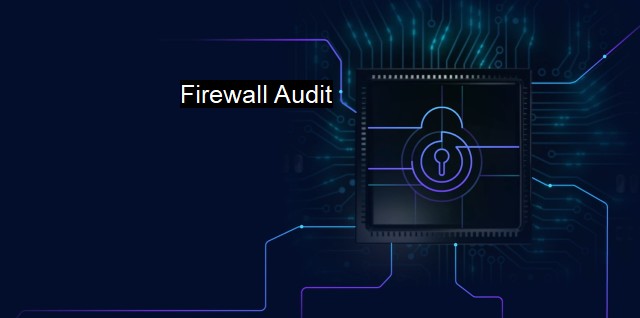What is Firewall Audit?
Understanding Firewall Audit: Importance in Maintaining Network Security Infrastructure
A firewall audit is the systematic evaluation and analysis of a firewall system's effectiveness and compliance with the established internal and external security standards. Firewall audits are essential in an era where cyber threats, hacking attempts, data breaches and intrusions are on the rise, aiming towards small, medium, and large-scale business organizations or even individuals. These audits act as routine inspections and maintenance shifts for an organization’s network security system, serving as a first line of defense against these cyber threats.The presence of a firewall system within an IT network creates a protective barrier which screens out malicious software, such as viruses, worms, trojans, before it can gain access to the network and inflict potential harm. In a broad perspective, such firewall systems play a pivotal role in keeping organizations’ critical information and data secure.
While the firewall systems themselves are essential, performing firewall audits holds similar significance as well. As it happens, firewall policies and configurations might not stay adequate forever. New pieces of malware are created and old ones evolve continually, so a cybersecurity strategy that worked perfectly yesterday might not be water-tight today. An important part of a firewall audit is to ensure the configuration settings best meet today's threat landscape.
Conducting firewall audits involves rigorous testing and inspecting existing firewall infrastructure, policies, rules and configurations currently in use. It’s not limited to checking whether specific firewall rules, such as allowing or denying traffic from specific IP addresses or ports, align with security policies, but also ensuring that the software associated with the firewall is up-to-date to enforce these rules effectively.
An important part of the firewall audit process is documentation. Auditors should maintain clear records of firewall setting histories, changes, and reasons for these changes. These documentation practices can reveal vulnerability patterns, help organizations promptly rectify their security strategies, and provide a valuable guide in shaping future security actions or responses.
The traditional methods for firewall audit are time consuming, faced with challenges relating to rule and change management, and deal with the audit compliance requirements. To perform audits seamlessly and successfully, organizations are turning to tools specifically designed to automate firewall audit process.
Such advanced firewall audit tools can identify risks and unnecessary complexities in firewall rules and configurations. They provide automatic assessment, reporting and streamlining of firewall rules and configurations, and offer support for almost every firewall vendor. From providing continuous monitoring options and real-time change notifications to retaining policy version histories, such audit tools make the task less time consuming and more effective.
Firewall audits serve several purposes in enhancing an organization's cybersecurity policies. They verify the completeness and effectiveness of an organization's firewall protection measures, ensuring the perfect blend of strong security standards and accessibility. These audits offer ways to uncover weaknesses before exploiters can acquire an advantage, aid in maintaining compliance with specific industry standards, and provide efficient ways to fix non-compliant items.
Firewall audits are integral parts of the cybersecurity landscape. They evaluate the robustness of firewall protection, thereby shielding companies and individuals against malicious attacks and potential data breaches. Organisations, irrespective of their size, should take a proactive approach in conducting regular firewall audits as part of their network security maintenance in order to safeguard their confidential information and ensure sound cyber hygiene.

Firewall Audit FAQs
What is a firewall audit and why is it important?
A firewall audit is a process of examining your firewall's configuration and rules to ensure that it is working effectively in protecting your network from cyber threats. It is important because it helps identify vulnerabilities and misconfigurations that can be exploited by cybercriminals.What are the benefits of a firewall audit?
A firewall audit helps companies to: 1) Identify and eliminate security gaps in the firewall 2) Improve the efficiency and effectiveness of the firewall 3) Meet compliance requirements and industry regulations 4) Provide insights into network traffic and potential security threats.How often should a firewall audit be conducted?
Firewall audits should be conducted regularly, typically once a year or after any significant changes to the network infrastructure. It is also recommended to perform a firewall audit after any major security incident occurs.Who should conduct a firewall audit?
A firewall audit should be conducted by an experienced cybersecurity professional or a team of professionals who have expertise in auditing and securing network infrastructure. It is also important to ensure that the auditors have no conflicts of interest and are independent from the IT staff responsible for maintaining the firewall.| | A | | | B | | | C | | | D | | | E | | | F | | | G | | | H | | | I | | | J | | | K | | | L | | | M | |
| | N | | | O | | | P | | | Q | | | R | | | S | | | T | | | U | | | V | | | W | | | X | | | Y | | | Z | |
| | 1 | | | 2 | | | 3 | | | 4 | | | 7 | | | 8 | | |||||||